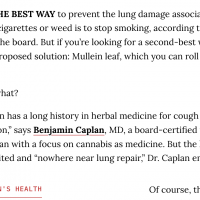Dr Caplan,
Can you help me understand Cannabis Use Disorder (CUD)? On the one hand, it seems universally accepted as a thing, in mainstream medical circles, but it also seems very wishy-washy as a diagnosis. Can you shed light? Who uses this diagnosis?
Hi Sarah,
Thanks for the question. This comes up often, these days, and it’s a topic that deserves a lot of clarity.
Firstly, it’s important to explain that the description of Cannabis Use Disorder (CUD) comes from the DSM-5, the Diagnostic and Statistical Manual of Mental Disorders, fifth edition.
I’ll share the aspects of the DSM definition below in numbers, and my comments about them, just below:

BC: Above are my underlined notes about how I think the very definitions of the symptoms that qualify toward a diagnosis of Cannabis Use Disorder are flawed. If the qualifiers are flawed – how can anyone have faith in the diagnosis itself?!
Explanations are below
1. Use of cannabis for at least a one year period, with the presence of at least two of the following symptoms, accompanied by significant impairment of functioning and distress:
BC: As you\’ll see with the other members of this list, it\’s pretty easy for anyone who enjoys cannabis, or for whom cannabis is actually helpful, to satisfy these criteria. Using it more than a year? Well, if it helps, isn\’t that a no-brainer? And, that part about \”accompanied by impairment of function or distress?\” Well, what if it\’s not the cannabis that\’s causing this impairment or distress, but an illness or another medication? According to an interpretation of this description, those would qualify!
2. Difficulty containing use of cannabis- the drug is used in larger amounts and over a longer period than intended.
BC: Just about anyone who finds cannabis helpful to treat an ailment or improve wellness is likely to keep using it, over time. The vast majority of people new to cannabis never imagine how beneficial it can be, and almost universally use cannabis for much longer than they envision, initially. And that part about using larger amounts? Well, we must consider the natural biology of tolerance. This happens to each of us, over time, with almost everything we do, from a warm morning shower, where you feel the need to increase heat over the shower duration to needing more and more coffee to sustain wakefulness during a day. This is simply the very nature of biology and human experience. If you try something that you enjoy, from a piece of candy to eyeglasses to the speed of a smartphone functioning, you\’re likely to get tolerant of it, and long for something even stronger.
3. Repeated failed efforts to discontinue or reduce the amount of cannabis that is used
BC: We live in a culture that has, flatly, demonized cannabis. For most, it\’s impossible to consume at certain times and in certain places (such as work, around certain friends and family). If you\’re someone who has found cannabis to ease chronic pain, or help you with social anxiety, you\’re likely to meet certain circumstances where you feel pressure to stop using cannabis (maybe it\’s the smell, maybe you can\’t be altered during a work meeting, etc.) On particularly tough days, you may even fail to avoid consuming, because the products and experience simply work well. And, what about the amount the you might use, on that particularly challenging day? Chances are likely that you\’ll want to consume more than you did under normal circumstances. So, if you don\’t reduce the amount you use (because according to the DSM definition, there is no positive scenario under any reality) and you\’ve had experiences taking cannabis when you weren\’t planning it – in this vain, you are satisfying this criteria too.
4. An inordinate amount of time is occupied acquiring, using, or recovering from the effects of cannabis.
BC: Prior to medical access and the legalization movement, procuring cannabis often meant discovering who might grow it and sell cannabis, a substance formerly considered really quite illegal. Just about everyone spent time trying to acquire it. And, if you happen to consume with friends or family, and if you enjoy the family aspects of socializing with cannabis – oops, you\’ve accidentally underscored this criteria too. And, silly cannabis – if you\’re operating within the bloodstream of a body that might have effects related to the consumption, or might be reacting to something totally different, such as dehydration, lightheadedness, or the sleepiness, you might find that such states feel like side effects of cannabis, even though they merely arise at the same time as cannabis is consumed. For instance, the same cannabis product, taken under conditions of adequate hydration, will feel different from, and may yield a different set of physical responses, than a product taken without sufficient hydration. Are we really ok blaming cannabis for body effects that are more simply attributed to hydration ? And, what about sleep? If you\’re not sleeping well, and the relaxation effects of cannabis help you sleep quickly and easily, is this adjustment considered a recovery from cannabis?
5. Cravings or desires to use cannabis. This can include intrusive thoughts and images, and dreams about cannabis, or olfactory perceptions of the smell of cannabis, due to preoccupation with cannabis.
BC: Just read that first sentence once more. If you crave relief, which cannabis provides, or seek to use it, for the relief, this box get ticked. Imagine suffering constantly, having medicines fail you and dissatisfy you, and cannabis helps. What person, in their right mind, wouldn\’t be thinking constantly about it, and how next to acquire that relief?! And, (a mock) shame on you if you happen to like the smell of eucalyptus or geranium flower, pine or lemon while you smell cannabis, because if memories of those come back, when you least expect it, this is bad news for the diagnostic formula.
6. Continued use of cannabis despite adverse consequences from its use, such as criminal charges, ultimatums of abandonment from spouse/partner/friends, and poor productivity.
BC: This item deserves some consideration in context. As of this writing, cannabis still is illegal, but it had been a lot more illegal in the past. It can also be pretty smelly, and not everyone enjoys the smell. Should someone who, quite likely, doesn\’t understand the relief you may be experiencing from cannabis) dislike your consumption, and should they ask you to stop – you\’ve earned yourself another checked tick box here. Productivity is a very important consideration here too. If someone breaks a leg and takes strong pain medicine. Would we really attribute their lack of productivity to the medicine? Or, similarly, if someone must miss work or school because of a virus and they take an antibiotic… are we really blaming the antibiotic for the lost productivity?
7. Other important activities in life, such as work, school, hygiene, and responsibility to family and friends are superseded by the desire to use cannabis.
BC: This is a fascinating one, simply because all it takes is empathy to imagine what someone might be going through, who has unbearable anxiety, unforgiving pain, inconceivable difficulty getting restful sleep. Someone in dire circumstances, and there are countless many who turn to cannabis as a last resort, would gladly skip work, school, or social obligations, as they discover long-lost relief. Who, in modern culture, doesn\’t skip a shower or hand washing, from time to time? do we live in such a rigid culture that playing hooky for a moment or two is worthy of condemnation in a diagnosis? It seems a little cruel to censure people who may find relief with cannabis, and an obvious desire to enjoy more of that reprieve, and amplify its presence in life.
8. Cannabis is used in contexts that are potentially dangerous, such as operating a motor vehicle.
Dangerous circumstances are, truly, in the eye of the beholder. Are drivers, wheeling around frustrated, angry, under-slept, really good drivers? What about drivers that take mind-altering prescribed opiates or benzodiazepine? Are those free of risk and responsibility? What about the countless individuals who have taken copious and strong amounts of cannabis regularly for years, and no longer feel altered anymore? From a perspective of misunderstanding how cannabis tolerance works (and a misreading of published literature of the true impact of cannabis on clear thinking and decision making), those who use cannabis for improvement are blindly knocked for doing so.
9. Use of cannabis continues despite awareness of physical or psychological problems attributed to use- e.g., anergia, amotivation, chronic cough.
BC: Cannabis consumption, over time, will cause physical and psychological changes, just as any stimulus, over time, would. What those changes and their magnitude might be, seems hard to identify to someone who is not experiencing them. The definition of \”problem\” is also typically describable by the one experiencing the potential \”problem\”, not outside observers. For people who experience long-lasting effects, including cough, reduced motivation, and a loss of energy, or consistent short-term memory changes, even as they may find benefit with other debilitating ailments, they are that much more likely to be labeled as having a use disorder.
10. Tolerance to Cannabis, as defined by progressively larger amounts of cannabis are needed to obtain the psychoactive effect experienced when use first commenced, or, noticeably reduced effect of use of the same amount of cannabis
BC: This criteria would be met by anyone who uses cannabis, even over short periods of time. Tolerance is something that happens to humans from almost every stimulus, from a warm shower to binge watching TV shows – we are preprogrammed to experience something, and to want more of that something. When the receptors in our brains are bombarded with a familiar signal, they are designed to spread the signal, to help adapt to new scenarios. If we didn\’t develop tolerance, we would scarcely be able to communicate effectively. We would be constantly distracted by the sounds around us, the body sensations within, and sensations that are continually new and unusual. We are programmed to feel the warm water of a shower as less and less warm. Chemical signaling in the body, including by nerves, hormones, and fibers of our muscles, depend on tolerance to properly function.
11. Withdrawal, defined as the typical withdrawal syndrome associate with cannabis, or cannabis or a similar substance is used to prevent withdrawal symptoms.
BC: Withdrawal is the other side of the coin of tolerance. If we like a candy or food, we may feel longing for it once it is withdrawn. When cannabis acts in the body, it becomes adapted and incorporated into the body\’s every day usual routines. As the steady supply of external cannabis fades away, in the body, the body naturally will naturally want to return to a state of comfort (in this case, the comfort provided by cannabis.) This could easily be described as an affect of success for cannabis doing what it should be doing, providing relief. But, under the microscope of a demonizing politics, sometimes it\’s hard to see more than just the bad.
The status of the disorder can be further qualified as follows:
- Early remission
- Sustained remission
An additional specifier for the status of the disorder is:
- In a Controlled Environment, e.g. a treatment facility or correctional facility where access to cannabis is limited.
The severity of the disorder is also noted, depending on the number of symptoms noted:
- Mild – Two or Three Symptoms
- Moderate- Four or five symptoms
- Severe- Six or more symptoms (American Psychiatric Association, 2013).





